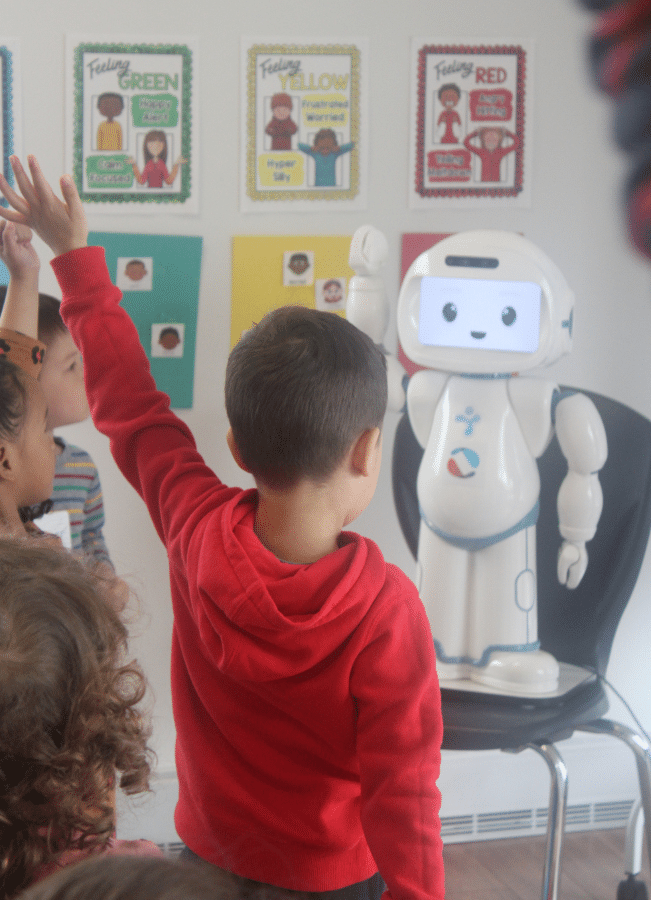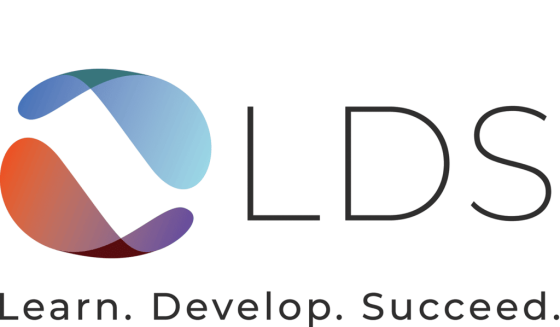LEARN ABOUT THE IMPORTANCE OF EARLY INTERVENTION PROGRAMS AND THE EXTRA LEARNING SUPPORT THAT’S AVAILABLE FOR CHILDREN
Where do you go for support if you suspect your 3-5-year-old child has learning challenges? How do you know when your child might need some extra support?
An innovative early years program at LDS – Learn. Develop. Succeed. is a place to begin. LDS is a nonprofit charity dedicated to empowering all children, youth, and adults with learning differences. They recognize their unique strengths and help students develop the tools needed to achieve lifelong independence, confidence, and success. You can learn more about their core values and programs here.
I recently visited the innovative early years program at LDS, Early RISErs. I observed a level of support that I had never seen before in this 10-week program. The team helped parents celebrate their child’s strengths and learn strategies to support their challenges.
As an early childhood educator, I know how crucial early intervention is for neurodivergent children, many of whom struggle in preschool. These struggles are often related to self-regulation, following daily routines, participating in activities, and handling transitions. I was thrilled to observe Early RISErs and see how the team worked with children with these challenges. The program looks similar to other preschool programs; however, parents attend, and specialists participate and work alongside families.
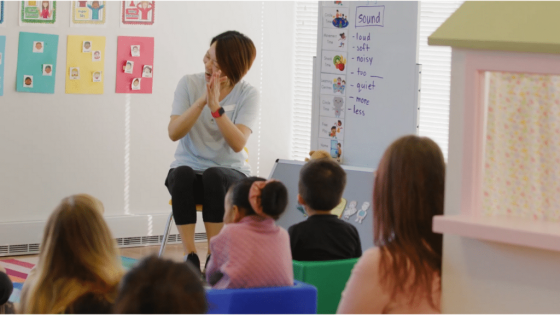
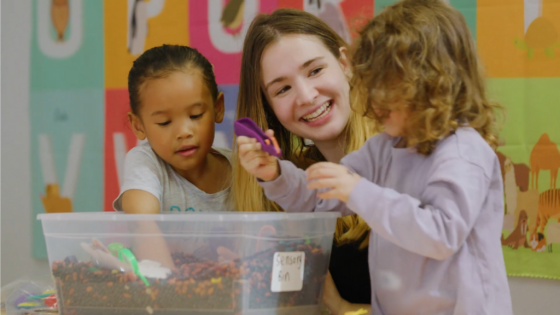
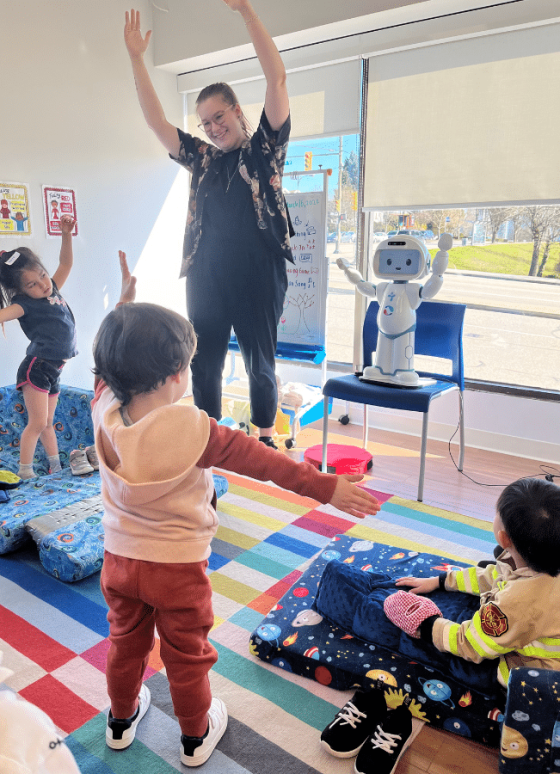
5 SPECIALISTS YOU’LL WANT TO CONTRIBUTE TO YOUR CHILD’S LEARNING AND DEVELOPMENT
- Speech Pathologist – to play with the children and model and encourage communication.
- Occupational Therapist – to guide the children to work through small steps to complete tasks.
- Behavioural Interventionist – to emotionally support children through everyday challenges and help them learn to self-regulate.
- Literacy Specialist – to introduce many communication tactics to converse with and connect with the children.
- The Early Childhood Educator – to collaborate with these specialists while guiding and caring for these young children through preschool programs and activities, including circle time.
I was very impressed when observing this program and learning that the early childhood educator leading this part of the Early RISErs program is also a licensed Kindergarten teacher.
Watching each specialist jump into various scenarios with each child was fascinating. The team learned about each child in a non-invasive way and put this learning into a report that families receive at the end of the program. The team supported parents/guardians during the program and with a final report. This report gave families a tool to advocate for their child in daycare, kindergarten, and beyond.
When Early RISErs finished for the day, I sat down with the Lead Instructor & Early RISErs Program Manager, Marlo Humiski. Here is what she shared with me.
INTERVIEW WITH MARLO HUMISKI, LEAD INSTRUCTOR & EARLY RISERS PROGRAM MANAGER
BC PARENT: How important is early intervention for families with young autistic children?
MARLO: Early diagnosis and early intervention are incredibly valuable to families with young autistic children. A diagnosis leads to information, support, and therapy if needed. It provides families with answers to some of their questions and a path to learning more about their child and how to help them develop and thrive. There is also government funding to help mitigate the expensive costs of resources, specialists, and therapists. However, this funding drops substantially around the time they enter Kindergarten, so the early years are crucial for maximizing the support available in Canada.
BC PARENT: Can you describe your classroom to us?
MARLO: Our classroom has become a supportive and understanding environment for families: a safe space to play, try new things, and ask questions. As both lead instructor and program manager, I am fortunate to work with the families from their very first phone call to their last day in our classroom. Sometimes, even beyond that! The support the families receive, and the community we create in each group is so impactful. It’s a privilege to be a part of so many young peoples’ journeys, to get to play and have fun, and to watch them grow more confident.
BC PARENT: Can you describe your Early RISErs program to us?
MARLO: Our one-of-a-kind early childhood education program brings together Speech-Language Pathologists, Kindergarten teachers, Early Childhood Educators, Behavioural Interventionists, and Occupational Therapists, to offer families a unique technology-embracing program. In this play-based program, parents get assessments, the opportunity to learn and connect, and strategies to address challenges.
BC PARENT: What is the goal of your program?
MARLO: Our goal is to create a collaborative space that connects families to a wide range of experts so that they can learn from each profession and ask any questions they may have about their child’s development. In many ways, the healthcare, education, and childcare systems are overloaded, and it can be difficult for families to connect with specialists due to financial barriers and/or lengthy waitlists. In the Early RISErs program, families build a relationship with the professionals, and they regularly have a safe space to ask questions and get support. Our expertise covers a wide range of topics, so we’re able to make recommendations specific to their child or connect them with other resources they may need. In addition to collaborating with families, we also collaborate with each other to implement the most relevant and effective strategies for each child. Everyone in our classroom is a learner, and we work as a community to support the children as they discover their learning styles and preferences.
BC PARENT: Who is this program for?
MARLO: Early RISErs is for parents/guardians and their 3-5 year-olds. Any family that wants to learn about their child’s learning and development can apply.
BC PARENT: What is the goal of your program?
MARLO: To offer families access to expert, specialized learning support to everyone, regardless of their ability to pay. Thanks to the generous sponsors of our donors, LDS continues to provide the highest calibre of research-informed individualized education to individuals ages 3 – adult with learning differences.
BC PARENT: What are your supporters contributing to when they offer their financial support?
MARLO: When you support LDS, you are helping students achieve lifelong independence, confidence, and success.
BC PARENT: How can families access these services?
MARLO: Families can apply here: https://ldsociety.ca/program/early-risers/
BC PARENT: What are the costs involved in this program?
MARLO: Fees are subsidized on a generous sliding scale.
BC PARENT: How often is this program offered?
MARLO: New cohorts start September 2024, January, and April 2025.
BC PARENT: What signs would you look for as a parent if you suspect your child might be neurodivergent and need some extra support?
MARLO: While it can be difficult to spot learning differences and developmental delays at a young age, there are signs we can observe and monitor that may be indicators:
- Delayed speech or limited vocabulary
- A tendency to echo back phrases to communicate
- Requires movement to focus, is constantly moving, or appears clumsy
- Overly sensitive or under responsive to certain visuals, sounds, textures, smells, or tastes
- Difficulty with daily tasks, such as dressing or using utensils
- Fine or gross motor challenges
- Transitioning from one activity to another is difficult or overwhelming
- Becomes quiet, disengaged, or dysregulated in certain environments
If you would like more information about their EarlyRISErs Program, visit their website here.


